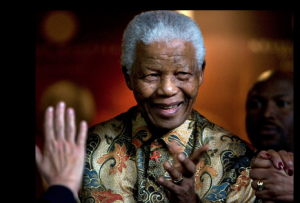December 8, 2013
By Scott Stearns - STATE DEPARTMENT — At his death, Nelson Mandela was revered in the United States as he was most everywhere else. But it was not always that way. U.S. views of Mandela evolved from Cold War Communist to anti-apartheid hero.
Former U.S. President John F. Kennedy said the United States in 1962 stood behind "an extraordinary group" of African leaders building new countries fresh from winning their independence.
"This has been an unknown continent to us because it was dominated by Europe. Now it's opening up, and we want to be part of it. And our interest is wholly disinterested. We have no great commercial history. We have no record of exploitation. We have supported the United Nations effort in Africa. We want them to be independent," said Kennedy.
For all his outreach to leaders in Algeria, Ghana and Guinea, Kennedy's extraordinary group of Africans did not include Nelson Mandela's African National Congress.
Trading partner
Apartheid South Africa was Washington's biggest Cold War trading partner in Africa, with reliable uranium supplies, ports of call for the U.S. Navy, and four missile-tracking stations. Secretary of State Dean Rusk opposed economic sanctions, warning that weakening white rule might lead to "Communist infiltration."
Former President Lyndon Johnson kept to the anti-Communism track despite then-Senator Robert F. Kennedy's 1966 meeting with banned ANC leader Albert Luthuli and his speech at the University of Cape Town during which he famously spoke of each strike against injustice creating ripples of hope.
"And crossing each other from a million different centers of energy and daring, those ripples build a current which can sweep down the mightiest walls of oppression and resistance," said Robert Kennedy.
During the Nixon and Ford administrations, the value of white rule as a bulwark against Communism was reinforced by Mandela's support for Cuban President Fidel Castro, and more than 30,000 Cuban troops in neighboring Angola who blocked a 1975 South African advance on Luanda.
When South African troops invaded Angola, Castro told reporters, Cubans could not stand by and do nothing.
Economic sanctions
Former President Jimmy Carter's Secretary of State Cyrus Vance led a United Nations delegation to South Africa in 1978 after Pretoria seized what is now Namibia. The Carter administration tightened an arms embargo, but continued to oppose economic sanctions.
Former President Ronald Reagan told CBS News anchor Walter Cronkite that if the United States could negotiate with Russia it could surely continue to negotiate "with a friendly nation like South Africa" that "strategically is essential to the free world in its production of minerals."
Author John Arquilla chronicled Reagan foreign policy. "At the height of the Cold War, South Africa was a place where the most important strategic resources were located - vanadium and other important strategic metals - in huge abundance. And so the authoritarian and racist government there was able to trade on that for some time because the Soviet Union, which was our enemy, had its own nature resources that greatly exceeded our own."
Anti-apartheid protests on U.S. college campuses grew. Congress voted to over-ride President Reagan's veto of economic sanctions. Congressman Louis Stokes told the television channel C-SPAN about civil disobedience outside the South African embassy.
"That was the least we could do because if Nelson Mandela could spend 28 years in a prison for fighting for his people and not having committed any crimes, we could certainly go to jail for one night to highlight the inequality of apartheid in South Africa," said Stokes.
With Mandela's release from prison in 1990, Former President George Herbert Walker Bush invited South African President F.W. deKlerk to the White House to show U.S. support for what he called a new brand of leadership more realistic about political change.
"The freeing of Mandela clearly is a very positive sign. I think there is more to be done, but there are things that he has done that deserve our support and our appreciation," said Bush.
U.S. anti-apartheid leaders opposed the invitation - the first for a South African president. Activist Randall Robinson said President Bush was moving too fast.
"I ask him to be consistent with previous American behavior on this issue and also be consistent with our responses to other nations that are lead by tyrants of this order," said Robinson.
'Hero for people everywhere'
Mandela's work for racial reconciliation and his election as South Africa's first popularly-chosen president made him, in former President Bill Clinton's words, a hero for people everywhere.
"For a long time, the name Nelson Mandela has stood for the quest for freedom. Apartheid could not silence him. And when he was freed, Americans all across this country who had fought for justice in South Africa rejoiced," said Clinton.
Past positions on ending apartheid became part of U.S. politics. Former President George W. Bush's campaign manager Karl Rove says it was part of vetting Vice President Dick Cheney. "Cheney had been a very conservative member of Congress from Wyoming, and we would have to defend his voting record, including voting against a resolution calling for the release of Nelson Mandela from prison."
Bush welcomed Mandela to the White House, calling him a symbol of courage. The South African needed a visa waiver, though, because he was still on an official U.S. terrorist watch list. Congresswoman Barbara Lee said it was a bipartisan effort to set that straight.
"This is one of those moments where we have seen the Secretary of State, Republicans, Democrats all of us working together to end this terrible, terrible policy that we have with regard to the ANC and Nelson Mandela," said Lee.
President Barack Obama says Nelson Mandela set the standard for service "whether we are students, shopkeepers or farmers, cabinet ministers or presidents. He calls on us to serve our fellow human beings and better our communities."

No comments:
Post a Comment